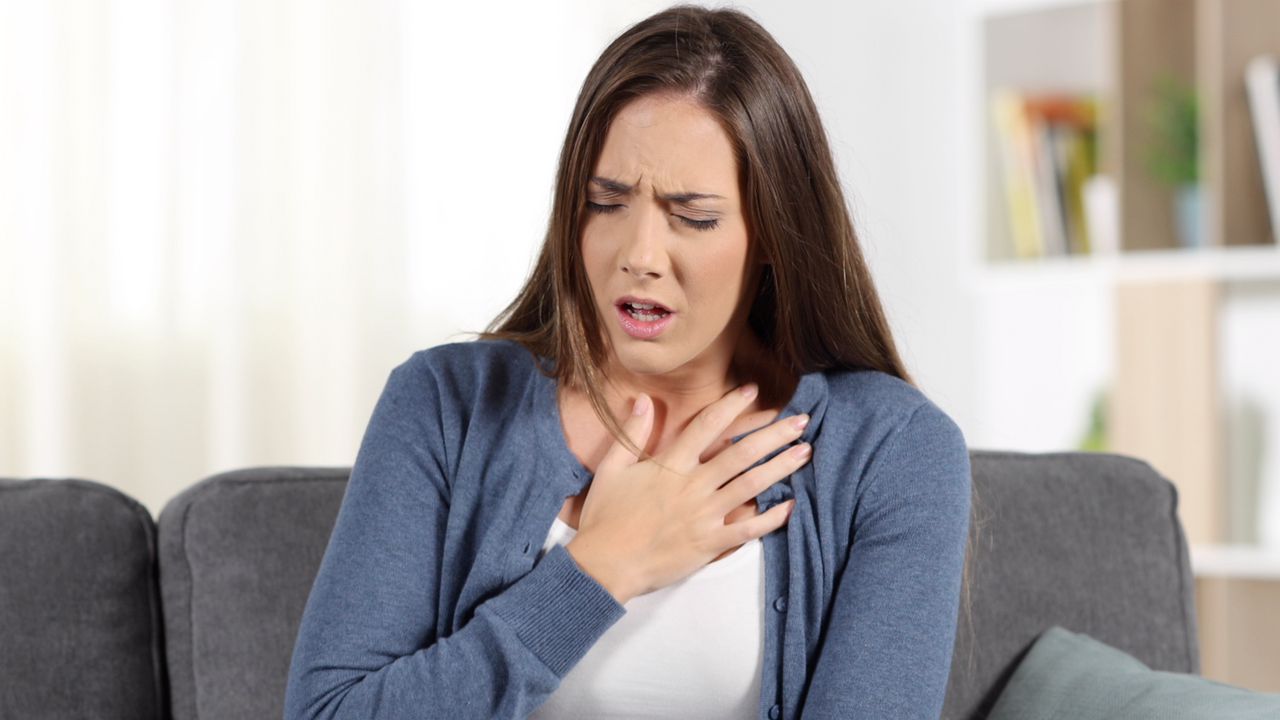
Key facts
- It’s normal to feel short of breath sometimes, especially when you exercise, but it may also be a sign of a health problem.
- Seek medical help immediately if you are short of breath and you have chest pain, difficulty talking, wheezing or a fever, you feel drowsy or your symptoms are getting worse.
- Shortness of breath can have many different causes, such as a lung problem, heart problem, infection, panic attack or allergic reaction.
- If you feel short of breath — lean forward, stay calm, take slow deep breaths and use your inhaler if you have one.
- Quitting smoking and losing weight can help prevent shortness of breath.
What is shortness of breath?
Shortness of breath is when you feel like you can’t get enough air into your lungs.
It’s normal to sometimes feel short of breath, when you exercise or physically work hard, and your body needs more oxygen. Sometimes, difficulty breathing may be a sign of a health problem.
Some health problems cause acute shortness of breath, which is where your symptoms come on suddenly and go away with treatment. Other conditions cause chronic shortness of breath, where you often find it hard to breathe without much effort.
When should I call an ambulance or go to the hospital emergency department?
Call triple zero (000) for an ambulance if someone is short of breath and:
- they can’t speak, or can only say single words
- they have pain in their chest, arm or jaw
- their skin is sweaty and pale
- their lips are blue
- they are drowsy or confused
See your doctor straight away or go to the hospital emergency department if you are short of breath and you:
- have swollen feet or ankles
- feel more short of breath when you lie down
- have fever, chills and a cough
- make wheezing noises when you breathe
- are getting worse over time
See your doctor if you notice you are becoming short of breath with less and less effort.
What should I do while I wait for an ambulance?
While you are waiting, try to stay calm. Sit upright and try to have someone with you if possible.
If you have asthma, take 4 puffs of your blue or grey reliever puffer. Take 4 more puffs every 4 minutes until help arrives.
What causes shortness of breath?
You might feel short of breath if you are living with obesity or if you have just done some strenuous exercise. The less fit you are, the more breathless you will feel when you exert yourself.
You may feel short of breath if you are pregnant or at high altitude.
Health problems that can cause shortness of breath include:
- lung problems, such as asthma, chronic obstructive pulmonary disease (COPD) or lung cancer
- heart problems, such as a heart attack or heart failure
- infections of your airways, such as croup, bronchitis, pneumonia, COVID-19, flu or even a cold
- a panic attack or anxiety
- allergic reactions
- pulmonary embolism
- anaemia
What other symptoms might I have?
Symptoms depend on what is causing your shortness of breath.
If your breathing problems are caused by a cold or a chest infection, you might also have a cough, fever, sore throat, sneezing, runny nose and congestion.
If the problem is to do with your heart, you may have difficulty breathing with exertion (physical effort) or when lying down. You might also have chest pain, leg swelling or palpitations. You may feel light-headed and nauseous.
If the problem is with your lungs, you might have a cough, a lot of mucous or a wheezing sound when you breathe. Your symptoms might get worse with exercise, or during the night.
If the problem is a panic attack, you might also experience a fast heartbeat, sweating and shaking, nausea, dizziness and a sense of being very anxious or stressed.
How is shortness of breath diagnosed?
Your doctor will ask about your symptoms and examine you. They can measure your oxygen levels with a small device that clips onto your finger.
They may arrange for you to have some tests, such as:
- an x-ray or CT scan of your chest
- lung function (breathing) tests
- an electrocardiogram (ECG) to check your heart
How is shortness of breath treated?
Treatment depends on what is causing your shortness of breath. It also depends on how unwell you feel and how suddenly it has come on.
Treatments may include:
- breathing oxygen through a mask
- help to quit smoking
- medicines such as puffers (inhalers)
- respiratory physiotherapy and breathing exercises
Here are some things you can do to make breathing easier:
- Take slow, deep breaths in through your nose and out through your mouth.
- Lean forward and support yourself with your arms.
- Carry a small fan to blow cold air on yourself.
- Learn relaxation techniques to calm yourself down.
- Have a plan for what to do if things get worse.
Can shortness of breath be prevented?
If you smoke, it’s important to quit. Quitting smoking can help prevent you developing lung problems. If you already have a lung problem, quitting smoking will make breathing easier.
If you are living with overweight or obesity, losing weight can prevent shortness of breath.
Here are some things you can do to avoid difficulty breathing:
- Take your time doing tasks that make it hard for you to breathe.
- Stay away from people who are smoking.
- Use several pillows to prop yourself up when you sleep.
- Take any medicines that your doctor has prescribed for your breathing.
- Make sure you know how to use your inhaler device.